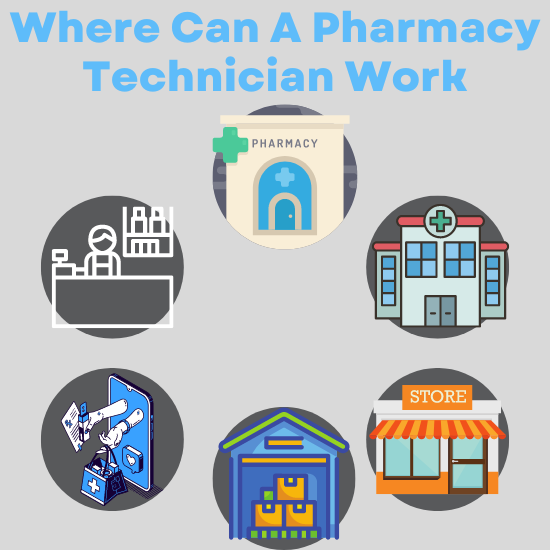How to Become A Pharmacy Technician
Reviewed By: Dr. KimDao Collier | Updated May 2025
The healthcare industry is an essential cornerstone of our society, and the people who serve within it are invaluable. According to the U.S. Bureau of Labor Statistics (BLS), the healthcare industry is projected to grow much faster than average for all occupations, adding 1.9 million job openings each year, on average, through 2033. And pharmacy technicians, in particular, are expected to grow 7%, which is faster than average.
In a recent article from the American Society of Health-System Pharmacists (ASHP), Diane Broome, program director for pharmacy technician advancement at Harris Health System said, “Nationwide, pharmacy technician turnover Is greater than 20%, and vacancy rates are as high as 40% … This shortage is a burden. It places a significant burden on our health systems, leads to increased workload for our pharmacists who have to perform technician tasks … this is not just a staffing issue. It’s a systemic challenge that requires immediate and long-term solutions.”
It's clear that the demand for pharmacy technicians remains strong. Could this be the right career path for you?

What does a Pharmacy Technician do?
Pharmacy technicians work under the supervision of a licensed pharmacist. Their responsibilities may vary depending on where they work, but can include:
- Labeling and packaging prescriptions
- Measuring medication
- Acting as a liaison between the customer and pharmacist
- Managing and organizing inventories
- Delivering medication to nursing stations, patients, or surgical rooms
- Accepting payments for medications
Pharmacy technicians have several options when deciding where they would like to work, including:

- Drug stores and pharmacies
- Hospitals
- Food and beverage stores
- Wholesalers
- Mail-order pharmacies
- Big-box retailers
Why become a Pharmacy Technician
Like many other jobs in the healthcare industry, pharmacy technicians get to help people every day. For a pharmacy to run efficiently, a pharmacy technician is essential. Other than helping people, there are many other reasons why becoming a pharmacy technician is a good career choice, such as:
- Good earning potential with a current annual median salary of $43,460. And, depending on where you work, the state you live in, the number of years of experience you have, and other factors, your salary could be even higher.
- Excellent opportunity to learn and grow throughout your career.
- Job security – With demand for pharmacy technicians evident and projected through the next decade, and likely beyond.
- It’s a great way to see if becoming a certified pharmacist is right for you
Steps to Become a Pharmacy Technician
With the right motivation and enough determination, you can become a pharmacy technician in just a few steps.
- Earn a high school diploma or equivalent
- Attend an accredited pharmacy technician training program
- Optional: Complete an externship
- Take the PTCT or ExCPT Certification exam
- Apply for a Job
The minimum education requirement to become a pharmacy technician is a high school diploma or equivalent, like the GED. If you want to become a pharmacy technician, but have not earned your high school diploma yet, there’s still time. U.S. Career Institute offers an Online High School Program, a healthcare pathway, so you can begin exploring the healthcare career while working toward your diploma.
Although it is possible to become a pharmacy technician with a high school diploma, many employers and states require formal training, certification, and/or a license. To meet this expectation, many pharmacy technicians choose to complete an accredited pharmacy technician training program, like the online pharmacy technician certificate program through U.S. Career Institute. Successful completion of this program will prepare you for the Pharmacy Technician Certification Exam (PTCE) administered by the Pharmacy Technician Certification Board (PTCB) and the Exam for the Certification of Pharmacy Technicians (ExCPT) offered through the National Healthcareer Association (NHA)
-Be sure to check with your state board for pharmacy professionals to determine the specific requirements in your area.
Completing an externship can be helpful when seeking employment. U.S. Career Institute proudly partners with Walgreens to provide externships for students that attend our Pharmacy Technician Certificate Program.
As previously mentioned, certification is required in many states and preferred by many employers to be a pharmacy technician. Once you have completed formal training through an accredited pharmacy technician training program or equivalent work experience, you will be prepared to take the pharmacy technician certification exam (PTCE).
Or you can choose to take the examination for certified pharmacy tecnicians (ExCPT) through the National Healthcareer Association (NHA). This certification requires that you complete a pharmacy technician training program within the last five years or have one year of work experience with at least 1,200 hours of supervised pharmacy-related work within the last three years.
Once you have passed your exam and have received your certification, you can start applying for entry-level pharmacy technician roles!
Getting Started
There has never been a better time to pursue your new career as a pharmacy technician. And with U.S. Career Institute, you can easily earn your high school diploma and complete essential career training online and at your own pace. Becoming a pharmacy technician is within reach and we would love to partner with you to help you achieve your career goals. Check out our available programs for more details or to enroll.
*Bureau of Labor Statistics, U.S. Department of Labor, Occupational Outlook Handbook, Pharmacy Technicians, on the internet at https://www.bls.gov/ooh/healthcare/pharmacy-technicians.htm, visited April 24, 2025). Statements found in the United States Department of Labor Occupational Outlook Handbook are not a guarantee of any post-graduation salary, in part because the data used to create the Occupational Outlook Handbook includes workers from differing educational backgrounds, levels of experience, and geographic areas of the country.
